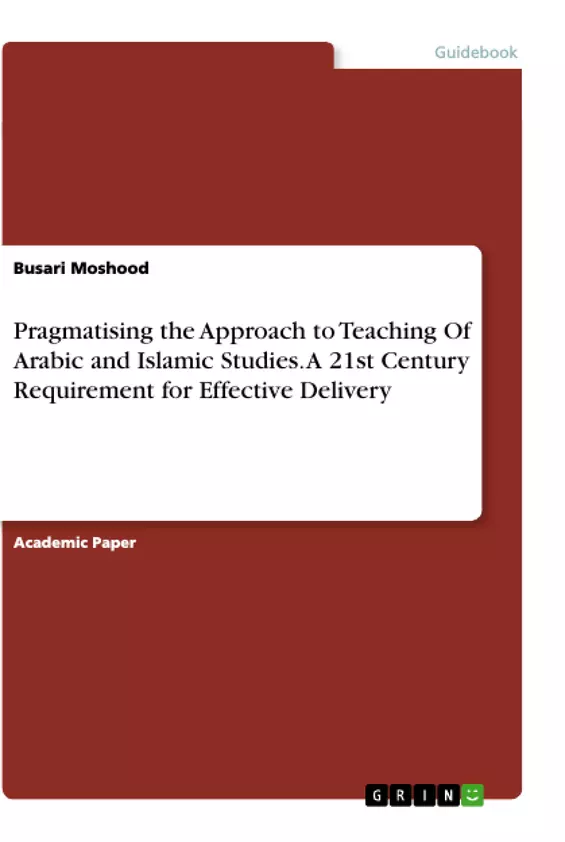Previous studies have dwelled extensively on the problems facing Arabic and Islamic education in Nigeria. Such problems as documented by literature include lack of unified syllabus, inadequate qualified teachers, unavailability of relevant textbooks and Government’s negative disposition to the subjects. As apt as these problems are, it is axiomatic to note that that a wrong approach to teaching the subjects is a fundamentally great impediment to effective and result-oriented delivery as far as the teaching of the subjects is concerned.
This is premised on the fact that irrespective of provisions made to address major problems militating against the survival of Arabic and Islamic Studies among other teaching subjects at all levels, the tendency for the subjects to remain backward and be treated with inferiority will still be there if a proper and pragmatic approach to teaching them are not institutionalized. It is on this note that this paper set out to examine the best approach to teaching the two subjects in the 21st Century. This study therefore espoused some wrong approaches employed in teaching the subjects with a view to ensuring a paradigm shift in order to achieve a better result from the teacher-student relationships otherwise known as education.
The paper, as a matter of background, made a deliberate attempt to exhume the history of Arabic and Islamic Studies in the educational sojourn of Nigeria. In the process, the travail as well as the fortune that characterised the emergence of the twin subjects was revealed. In our assessment of the situation, it could be adjudged as a natural birth from “grass” and growth to “grace” as the subjects stand today. New approaches were consequently suggested as a way to “right” the “wrong” in terms of teaching methodologies and hence pragmatising the old techniques as suggested by the topic of the paper. Though the study focused majorly on Arabic and Islamic Studies at the Secondary School Level, its thrust is of universal application across subjects and levels of education in Nigeria.
Inhaltsverzeichnis (Table of Contents)
- Introduction
- Methodology
- Definition and Conceptualization of Teaching as a Major Terminology in Education
- Brief History of Arabic and Islamic Education in Nigeria
- Teaching and Learning of Arabic/Islamic Studies Under Religious Education
Zielsetzung und Themenschwerpunkte (Objectives and Key Themes)
This paper aims to explore the most effective approach to teaching Arabic and Islamic Studies in the 21st century in Nigeria. It examines the challenges faced by these subjects in Nigeria, highlights past approaches to teaching them, and proposes pragmatic methods to improve their delivery.
- The importance of a pragmatic approach to teaching Arabic and Islamic Studies.
- The historical development of Arabic and Islamic education in Nigeria.
- The challenges faced by Arabic and Islamic Studies in the Nigerian education system.
- The impact of western education on Arabic and Islamic Studies.
- The need for a paradigm shift in teaching methodologies.
Zusammenfassung der Kapitel (Chapter Summaries)
- Introduction: The paper introduces the concept of teaching versus delivery, emphasizing that effective teaching should result in tangible outcomes. It sets the stage for the study by focusing on the need for a pragmatic approach to teaching Arabic and Islamic Studies.
- Methodology: The study utilizes a historical research methodology, examining the past, present, and future of Arabic and Islamic education in Nigeria. This approach involves analyzing primary and secondary sources of information.
- Definition and Conceptualization of Teaching as a Major Terminology in Education: This chapter explores various perspectives on the definition and conceptualization of teaching, highlighting its significance in educational processes.
- Brief History of Arabic and Islamic Education in Nigeria: This section delves into the historical roots of Arabic and Islamic education in Nigeria, tracing its evolution from the early fourteenth century. It discusses the influence of Islam on education, the emergence of Qur'ānic schools, and the impact of Western education on Arabic and Islamic Studies.
- Teaching and Learning of Arabic/Islamic Studies Under Religious Education: This chapter focuses on the integration of Arabic and Islamic Studies into the Nigerian National Curricula for religious education. It explores the evolution of the syllabus, the role of traditional Mallams, and the emergence of Arabic as a recognized teaching subject in the Nigerian education system.
Schlüsselwörter (Keywords)
This paper focuses on the key topics of Arabic, Islamic Studies, pragmatic approaches, paradigm shifts, teaching methodologies, and educational delivery in the Nigerian context.
- Arbeit zitieren
- Dr. Busari Moshood (Autor:in), 2022, Pragmatising the Approach to Teaching Of Arabic and Islamic Studies. A 21st Century Requirement for Effective Delivery, München, GRIN Verlag, https://www.hausarbeiten.de/document/1183763


